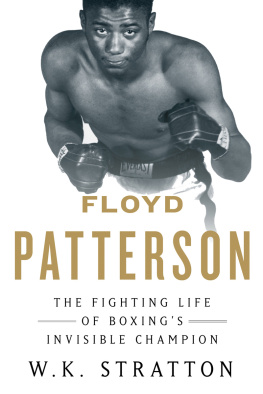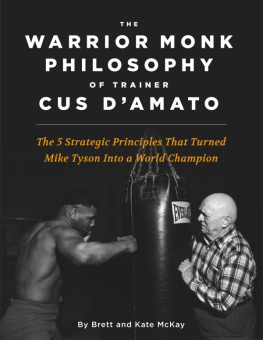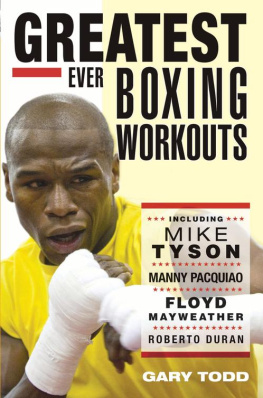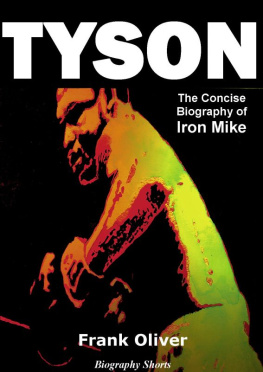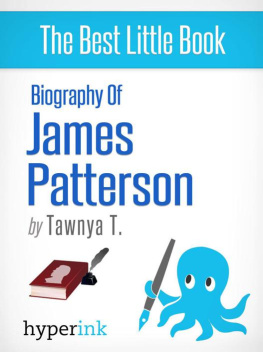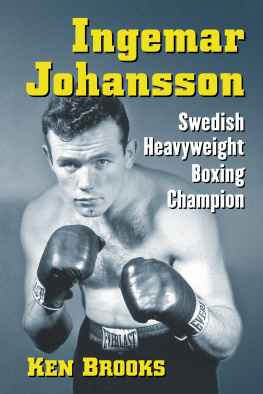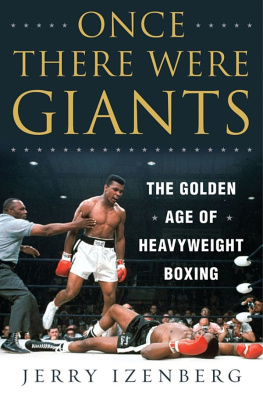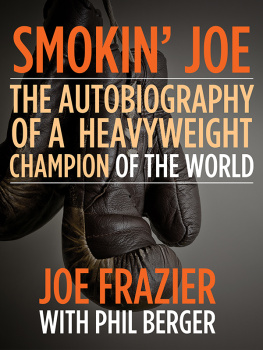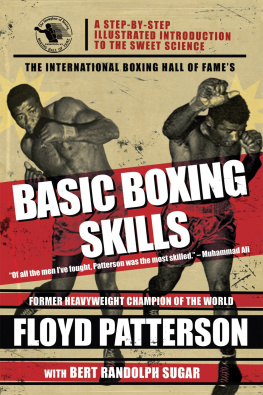Copyright 2012 by W. K. Stratton
All rights reserved
For information about permission to reproduce selections from this book, write to Permissions, Houghton Mifflin Harcourt Publishing Company, 215 Park Avenue South, New York, New York 10003.
www.hmhco.com
Library of Congress Cataloging-in-Publication Data is available.
ISBN 978-0-15-101430-9
e ISBN 978-0-547-53755-9
v2.0114
The author is grateful for permission to quote from the following sources: Letter from Archie Moore to Floyd Patterson, reprinted by permission of JMarie Moore. The Fight: Patterson vs. Liston 1963 by James Baldwin. Originally published in Nugget. Copyright renewed. Collected in The Cross of Redemption: Uncollected Writings by James Baldwin, published by Pantheon Books. Reprinted by arrangement with the James Baldwin Estate.
For Richard Lord and John Schulian
Brother,
This is advice from a friend who has been watching you closely. Do not go too fast. Keep working for the people but remember that you are one of us and do not forget if you get too big they will cut you down. You are from the South and you know that this is a white mans world. So take a friendly advice and go easy so that you can keep on helping the colored people. They do not want you to go too fast and will cut you down if you do. Be smart ...
R ALPH E LLISON , Invisible Man
Prologue
Nothing Short of Miraculous
T HE THERMOMETERS IN midtown Manhattan registered a near-record high as dusk approached, but heat was not the worst meteorological malady afflicting New Yorkers that September day. Sulfur-based clouds floated eerily down the streets. A peculiar set of weather conditions had combined with the ever-present smoke belching from chimneys and exhaust pipescommon in the days before widespread pollution control. Calls from panicked city dwellers, their eyes burning and throats scratchy, tied up phone lines to police stations and newspaper offices. But neither cops nor reporters knew what to do about the noxious air, though there was a new word to describe this troublesome phenomenon: smog. Officials recommended that people stay inside until the situation improved.
That was not an option for seventeen-year-old Floyd Patterson. The newsreel announcers of the day might have pronounced Friday, September 12, 1952, as Pattersons date with destiny. At the very least, it marked the beginning of the prizefighting career he had dreamed of since elementary school. No way would toxic billows set him back.
Besides, the sulfurous air smelled sweet compared to what Floyd found inside the St. Nicholas Arena, where thick cigarette and cigar smoke all but obscured the boxing ring. Though not as famous as Madison Square Garden, St. Nicks had hosted thousands of fights over the previous fifty years. In fact, privately staged matches were held there even before boxing could be legally presented as a public event in New York, and it had become a favorite venue for Manhattan fight fans. Novelist and boxing aficionado Budd Schulberg lovingly recalled it as a place where Damon Runyons guys and dolls were all around ringside, and the balcony was full of blue-collar holler guys ready to fight themselves. On this night, they were all out in force despite the smog, the swells and the working stiffs alike sweating in the unseasonable heat, to watch Olympic phenom Floyd Patterson box professionally for the first time.
Still, Patterson was anything but confident before the fight. Earlier in the day, as he fretted about the outcome, his mother had tried calming him by listing all hed accomplished as an amateur. But her efforts were to little avail. Floyd remained nervous as he ate his typical breakfasta chocolate barat the subway station, and he grew even more anxious at the New York State Athletic Commission offices and the prefight weigh-in. There, gravel-voiced reporters lobbed questions while photographers aimed their cameras at him, flashbulbs popping like punctured balloons. Floyd hated it. He didnt feel comfortable on public display like this, and he preferred having DAmato answer questions for him. He was happy to flee when the weigh-in was over. Floyd ate lunch, and DAmato checked him in to a hotel, which was blessedly cool. Despite his nerves, he napped for most of the afternoon before departing for St. Nicks. He found it easy to fall asleep.
Floyds nap did nothing to relieve his prefight jitters. He continued to worry about how well he would perform in the ring as his trainer, Frank Lavelle, wrapped his hands and laced on his gloves. When it was time for his bout, Patterson climbed into the ring, wearing the robe hed earned as a member of the US Olympic team. The scene could have come straight from a Warner Bros. film noir popular at the time. Sportswriters, press cards stuck in the bands of their fedoras, crowded around the platform. Photographers with their ever-present Graflexes jockeyed for position along the ring apron. Stocky made-men with their ladies of the moment lounged in the expensive seats just behind the press. In the smoky darkness beyond them were the shouting stevedores and longshoremen in the cheap seats.
The bell rang, and Patterson delivered his first punches as a professional boxer, quickly making it clear that the prognosticators had been right. It was no contest. Godbold made it only to the fourth round before Floyd knocked him out. Patterson collected $300 for his nights work. He cared about the money, but the important thing was that he was now in the books as a prizefighter. He sensed a whole world of possibilities opening up for him.
Virtually no one who stepped out of St. Nicks into the foul vapors of that New York night could have fully known what had just been witnessedthe beginning of a two-decades-long career that would change sports in general and boxing in particular. A career that set records, earned Floyd Patterson millions of dollars, and made him one of the most famous people in the world, at least for a time. A career that thrust him to the forefront of the civil rights movement, gave him access to the most powerful American politicians of the day, and set the mold for athletes desiring to speak out about social causes. A career that would be wrapped in controversy, winning him both devoted fans and harsh critics.
Young men on the bottom rungs of American society have long turned to boxing to climb toward a better life. No one had a greater distance to scale than Floyd, a troubled kid who befuddled even those closest to him. Hes a kind of a stranger, DAmato had said. But Floyd also endured countless blows to the head over his long career, often winding up on the mat. No important boxing champ was knocked down more during vital contests than Patterson. Yet he possessed an extraordinary ability to get up after those knockdowns and battle on to claim victory.
Patterson was an overachiever who bootstrapped his way to the top, an all-American success story. As happens with many, perhaps most, such American heroes, he fell from popular favor as his skills waned and the nations tastes changed. But on this smoggy New York night, he had no notion what fate awaited him. As he rode the subway home, he had money in his pocket and the prospect to make more, in a sport he loved. Such good fortune was beyond the fantasies of poor kids from Brooklyns Bedford-Stuyvesant. For people who had known Floyd Patterson as an invisible ghetto childa child indistinguishable from thousands of others trapped in urban povertyhis becoming a professional boxer was nothing short of miraculous. Just a few years earlier, it seemed unlikely hed turn out to be anything at all.
I Dont Like That Boy!
O NE THING YOU could always say about Thomas Patterson: heard from relatives that things were better up north. So they decided to depart North Carolina, with its poverty and its segregation, and seek out a better life elsewhere.
Next page
